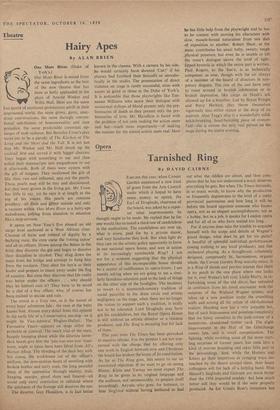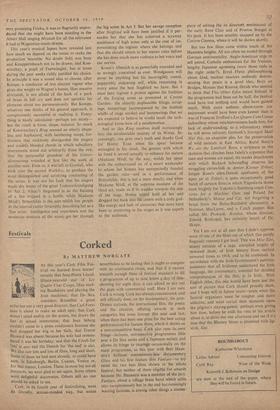Opera
Tarnished Ring
By DAVID CAIRNS
EARLIER this year, when Covent Garden announced a new kind of grant from the Arts Council under which it hoped to have more money to spend, the Earl of Drogheda, chairman of the board, was asked by a repor- ter what improvements he thought ought to be made. He replied that he for one would like to install a third row of candelabras in the auditorium. The candelabras are now up, what is more, paid for by a private donor, and very handsome they look. But what light do they cast on the artistic policy apparently in force in our national opera house, and seen in action in its increasingly ramshackle Ring? I am not for a moment suggesting that the physical appearance of this incomparable house should be a matter of indifference to opera-lovers. I am merely asking when we are going to see a simi- larly fastidious attention paid to the look of things on the other side of the footlights. The tendency to revert to a nineteenth-century tradition of social punctilio in the dress circle and artistic negligence on the stage, when there are no longer the voices to support such a tradition, is really not to be tolerated. Lord Drogheda may have got his candelabras, but the Royal Opera House is still without an artistic director or a resident producer, and The Ring is decaying fast for lack of them.
This year even The Times has been provoked to massive rebuke. For the present I am not con- cerned with the charge that by offering only one work in English between now and Christmas the board has broken the terms of its constitution. As far as The Ring goes, this seems to me an overstated objection. If we want to go on seeing Hotter, Klein and Varnay we must expect The Ring to be given in its original language and the audience, not unreasonably, to prepare itself accordingly. Anyone who goes, for instance, to hear Siegfried without having bothered to find out what the riddles are about, and then com- plains that he has not understood a word, deserves everything he gets. But when The Times demands, in so many words, to know why the production so frequently degenerates to the level of a seedy provincial pantomime and how long it will be before the board appoints someone who knows opera, not as an elegant accomplishment, not as a hobby, but as a job, it speaks for London opera and for all of us who have waited too long.
For if anyone does take the trouble to acquaint himself with the scope and details of Wagner's grand design, what does he get for his pains? A handful of splendid individual performances (owing nothing to any local producer), and fine orchestral playing. As a thought-out, coherently designed, competently lit, harmonious, organic whole, the Covent Garden Ring scarcely exists. It is a Ring of shreds and patches (except that there is no patch in the one place where one looks for it, over Wotan's left eye). Leslie Hurry, in re- furbishing some of the old decor, has retreated in confusion from his timid encounter with the outposts of the Wieland Wagner system, and taken up a new position under the crumbling walls and among all the refuse of old-fashioned realism. Handing now has a very palpable hut, but of such hideousness and pointless complexity that we fancy ourselves in the junk-corner of a monstrous, abandoned timber yard. The slight improvement in the Hall of the Gibichungs comes late, and is small compensation. The lighting, while avoiding some of the more start- ling surprises of former years, has sunk into a kind of morose brooding and takes little part in the proceedings. And, while the Hotters and Kleins go their imperious or cringing ways un- touched by the desert around them, their lesser colleagues wilt for lack of a helping hand. Miss Shuard's Sieglinde and Gutrune are much better than the 1958 imported models: but how much better still they would be if she were properly produced. As for Ursula Bose's immature but very promising Fricka, it was so flagrantly unpro- duced that she might have been standing in the Albert Hall singing Messiah for all the relevance it had to Wagnerian music-drama.
This year's musical lapses have revealed just how much we depend on the music to make the production bearable. No doubt Solti was busy and Knappertsbusch not to be drawn; and Kon- witschny, a pupil of Furtwangler, has at times during the past weeks richly justified his choice. In principle it was a sound idea to choose, after Kempe, a conductor of less discreet vigour who gives due weight to Wagner's basses, likes massive sforzandi, is not afraid of the bark of a pack of brass in full cry and does not sprinkle his climaxes about too parsimoniously. But Kempe, whatever one thinks of his general approach, is conspicuously successful in realising it. Every- thing is nicely calculated—perhaps too nicely— but the result is form, shape, balance. So much of Konwitschny's Ring seemed so utterly shape- less and haphazard, with lumbering tempi, for- tissimos that recklessly disregarded the singers and crudely blended chords in which subsidiary instruments stood out arbitrarily from the rest, that the purposeful grandeur of his Gaiter- diimmerung sounded at first like the work of another man. Even so, it was left to Goodall, who took over the second Walkiire, to produce the most distinguished and satisfying conducting of the series. It was not his fault that his singers made dry bones of the great Todesverkiindigung in Act 2; Vinay's Siegmund is as the buzzing of a bee trapped in a bottle, while Madame MOdl's Brtinnhilde is the sort which has people in the interval rather feverishly describing her as a `fine artist.' Intelligence and experience and the moderate tessitura of the music got her through the big scene in Act 3. But her savage reception after Siegfried will have been justified if it per- suades her that she has achieved a scrawny semblance of high notes only at the cost of im- poverishing the register where she belongs, and that she should return to her mezzo roles before she has done much more violence to her voice and our nerves.
Kraus's Alberich is as powerfully executed and as wrongly conceived as ever. Windgassen will never be anything but his incorrigibly casual, puppyishly endearing self, while remaining in every sense the best Siegfried we have. But I must here register a protest against the futilities of the forging scene as presented at Covent Garden : the abjectly implausible filings, scrap- ings, temperings (accompanied by the feeblest whiffs of stage smoke) and hammerings that we are expected to believe in would insult the tech- nological know-how of a needleworker.
And so this Ring resolves itself increasingly into the invulnerable majesty of its Wotan. In- creasingly, one grits one's teeth and thanks God for Hotter. Even when his spear became entangled in his cloak, the gesture with which he freed it served actually to enhance his stature (Madame Mtidl, by the way, wields her spear with the embarrassed air of a smart weekender to whom her hostess has unexpectedly handed the garden rake—and in a performance of Briinnhilde, this is not a mere detail); and when Madame MOdl, at the supreme moment of the third act, made as if to wander towards the side of the stage, Hotter seized hold of her and dragged her back into the centre with a truly god- like energy and lack of ceremony that must have been as unnerving to the singer as it was superb to the audience.







































 Previous page
Previous page